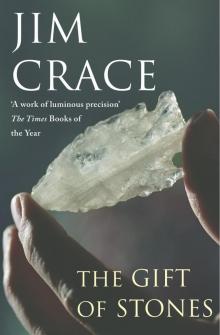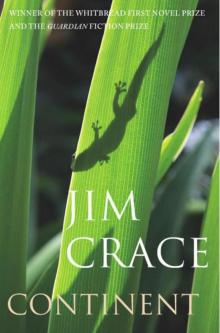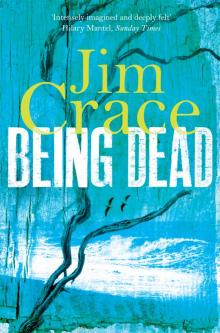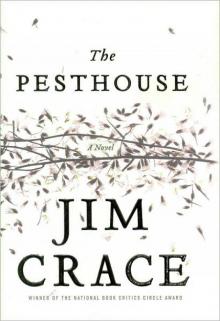Quarantine Read online
Table of Contents
Title Page
Epigraph
1
2
3
4
5
6
7
8
9
10
11
12
13
14
15
16
17
18
19
20
21
22
23
24
25
26
27
28
29
30
31
ALSO BY JIM GRACE
Praise for Quarantine
Copyright Page
An ordinary man of average weight and fitness embarking on a total fast — that is, a fast during which he refuses both his food and drink — could not expect to live for more than thirty days, nor to be conscious for more than twenty-five. For him, the forty days of fasting described in religious texts would not be achievable — except with divine help, of course. History, however, does not record an intervention of that kind, and medicine opposes it.
Ellis Winward and Professor Michael Soule,
The Limits of Mortality, Ecco Press, New Jersey (1993)
1
Miri’s husband was shouting in his sleep, not words that she could recognize but simple, blurting fanfares of distress. When, at last, she lit a lamp to discover what was tormenting him, she saw his tongue was black – scorched and sooty. Miri smelled the devil’s eggy dinner roasting on his breath; she heard the snapping of the devil’s kindling in his cough. She put her hand on to his chest; it was soft, damp and hot, like fresh bread. Her husband, Musa, was being baked alive. Good news.
Miri was as dutiful as she could be. She sat cross-legged inside their tent with Musa’s neck resting on the pillow of her swollen ankles, his head pushed up against the new distension of her stomach, and tried to lure the fever out with incense and songs. He received the treatment that she – five months pregnant, and in some discomfort – deserved for herself She wiped her husband’s forehead with a dampened cloth. She rubbed his eyelids and his lips with honey water. She kept the flies away. She sang her litanies all night. But the fever was deaf Or, perhaps, its hearing was so sharp that it had eavesdropped on Miri’s deepest prayers and knew that Musa’s death would not be unbearable. His death would rescue her.
In the morning Musa was as numb and dry as leather, but – cussed to the last – was gripping thinly on to life. His family and the other, older men from the caravan came in to kiss his forehead and mumble their regrets that they had not treated him with greater patience while he was healthy. When they had smelled and tasted the sourness of his skin and seen the ashy blackness of his mouth, they shook their heads and dabbed their eyes and calculated the extra profits they would make from selling Musa’s merchandise on the sly. Musa was paying a heavy price, his uncles said, for sleeping on his back without a cloth across his face. An idiotic way to die. A devil had slipped into his open mouth at night and built a fire beneath the rafters of his ribs. Devils were like anybody else; they had to find what warmth they could or perish in the desert cold. Now Musa had provided lodging for the devil’s fever. He wouldn’t last more than a day or two – if he did, then it would be a miracle. And not a welcome one.
It was Miri’s duty to Musa, everybody said, to let the caravan go on through Jericho towards the markets of the north without her. It couldn’t travel with fever in its cargo. It couldn’t wait while Musa died. Nor could it spare the forty days of mourning which would follow. That would be madness. Musa himself wouldn’t expect such waste. He had been a merchant too, and would agree, if only he were conscious, God forbid, that business should not wait for funerals. Or pregnancies. Fortunes would be lost if merchants could not hurry on. Besides, the camels wouldn’t last. They needed grazing and watering, and there was no standing water in this wilderness and hardly any hope of rain. No, it was a crippling sadness for them too, make no mistake, the uncles said, but Miri had to stay behind, continue with her singing till the end, and bury Musa on her own.
She’d have to put up stones to mark her husband’s passing and tend his grave until the caravan returned for her. She would be safe and comfortable if she took care. There was sufficient water in skins for a week or so, and then she could locate a cistern of some kind; there were also figs and olives and some grain, some salted meat and other food, plus the tent, the family possessions, small amounts of different wools, a knife, some perfume and a little gold. She’d have company as well. They’d leave six goats for her, plus a halting donkey which was too slow and useless for the caravan. Two donkeys then. Both lame, she said, nodding at her husband.
Nobody laughed at Miri’s indiscretions. It did not seem appropriate to laugh when there was fever in the tent, though leaving Musa behind, half dead, was a satisfying prospect for everyone. With luck, they said, Musa would only have to endure his suffering for a day or two more. And then? And then, when Miri had done her duty to her husband, they suggested, there would be habitations in the valley where she could, perhaps, seek refuge. She might find a buyer for the gold; take care, they warned, for gold can bring bad luck as well. Or she might employ the goats to buy herself a place to stay for her confinement – until the caravan had a chance to come for her and any child, if it survived. Eventually, she’d have the profits from her husband’s merchandise which they would trade on her behalf, the sacks of decorated copperware from Edom, his beloved bolts of woven cloth, his coloured wools. She smiled at that and shook her head and asked if they imagined that she was a halting donkey too. No, no, they said; why couldn’t she have more faith in their honesty? Of course there would be profits from the sale. They would not want to say how much. But she might be rich enough to get another husband. A better one than Musa anyhow, they thought. A smaller one. An older one. One that didn’t lie or use his fists so frequently, or shout and weep and laugh so much. One who didn’t get so drunk, perhaps, then sit up half the night throwing pebbles at the camels and his neighbours’ tents, pelting goats’ dung at the moon. One that didn’t stink so badly as he died.
They promised they would return by the following spring, one year at the latest. But Miri understood there’d be no spring to bring them back, no matter where they went. They’d make certain that their winters didn’t end. Why would they come so far to reclaim the widow and the orphan of a man who’d been so troublesome and unpredictable? Besides, they wouldn’t want to lose the profits they had made. Not after they had held them for a year. No, Miri was not worth the trip. That was the plain, commercial truth.
So Miri let them go. She spat into the dust as they set off along the crumbling cliff-tops to the landslip where they could begin their descent. Spitting brought good luck for traders. Deals were struck with a drop of spit on a coin or in the palm of the hand or sometimes even on the goods to be exchanged. Spit does better business than a sneeze, they said. So, if anyone had dared to look at Miri, they could have taken her spitting to be a blessing for their journey. But no one dared. They must have known that she did not wish them well. They’d given her the chance to change her life, perhaps. But inadvertently. No, Miri despised them for their haste and cowardice. Her spitting was a prayer that they would lame themselves, or lose their cargoes in the Jordan, or have their throats sliced open by thieves, their eyes pecked out by birds. She felt elated, once the uncles and their animals had gone. Then she was depressed and terrified. And then entirely calm, despite the isolation of their tent and the nearness of her husband’s death. She would not concern herself with the practicalities of life. Not yet. Women managed with much less. For the moment she could only conce
ntrate on all the liberties of widowhood – and motherhood — which would be hers as soon as he was dead.
2
It was midday, and Miri opened up the outer awnings of the tent so that she could both clear the air of death’s bad breath and inspect the landscape for signs of life. Did she expect the caravan, already troubled by its conscience, to turn around for her? Or was she simply fearful of the leopards, wolves and snakes which were at home amongst these hills? She sat cross-legged in bands of sunlight, next to her husband’s wrapped body, her hand resting almost tenderly on his ankles. He had a fading pulse. And he was all but silent now. A whistling throat, that’s all. He’d lost the strength to shout. And he was cold. So was the inside of the tent.
Miri stared into the distant tans and greys of Judea, trying to remember what she was required to do for him, what prayers, what body herbs, what disposition of the limbs. She’d done her duty in the night and tried to lure the devil out. But that had failed. Her husband’s body was a labyrinthine hiding place, so full of caves and chambers that many devils could make homes inside. What was her duty to him now? To call on all the gods by name and ask for mercy for this man? To combat his illness, like the perfect, patient wife, with oils and salves and kisses? To find a stone and drop it on his skull? No, nothing that she did would make a difference. That was the truth, bleak and comforting. Her husband was unconscious and about to die, and she should leave him to it. Let the devil do its work behind her back.
Anyway, this vigil was exhausting her. She could not sit a single moment more. Her child was strong and vigorous; it had pressed its arms and legs against her hips so unremittingly that within the past few months her pelvic bones had widened and the nerves were trapped. Her buttocks and her thighs were torments. She felt she had to move out of the tent or turn to stone. This was the remedy. She would simply walk away – if, first, she could defy the pain and stand up – and return that afternoon to a corpse. It might be cowardly to leave a man to die alone, but there was no one there to block her path. No one conscious anyway. Musa couldn’t use his knuckles or his fingers or his heels against her now. He couldn’t pull her hair to make her stay. She laid the dampened cloth across his mouth – to keep the devils in, perhaps? – loosely tethered the ailing donkey, and staked the one billy amongst the female goats. Then, turning her back against the flaking crown of the cliffs, she went off across the level scrub towards the valleys and low hills in search of well-drained ground and her husband’s undug grave.
It would be hard, she knew, to bury Musa. Hard on the heart, but harder on the fingers. For he was large. She would have to take great care when lifting heavy rocks or tearing at the ground. There were pans of soft clay along the valley beds where anyone – a child even; a child would not resist the opportunity to make its mark in clay – could crack a hole in the earth simply by stamping. But the higher ground where Musa’s body would be safe from floods was biscuity like ash-fired pot. Underneath the biscuit there were stones.
Miri hunted for a burial place with views across the salty valley. It was not long before she’d found the perfect spot, an open scarp, backed by low, coppery cliffs, pock-marked by many caves and – it was spring – discoloured by the opposing red of scrub poppies. The world from there would seem large and borderless, she thought, and that would be appropriate for a traveller like Musa whose excursions had been ceaseless while he lived and who would soon find that death was large and borderless as well.
It was a tender day for widowhood, warm and clear and breathless. There in the sinking distance, two days’ walk away at most, was the heavy sea below Jericho, and then the cliffs of sodium and brine, the careworn hills, the bluing heights of Moab, and finally (because she could not think that there was any heaven in this place) the rifting, hard-faced sky. It was clouded only by the arrowed streamers of the spring birds, heading for the Danube from the Nile.
What better place to pass eternity?
But for the living Miri it was hard. She felt large and borderless herself So far her marriage – a few months old, and to a younger, tougher man – was inflexible and empty, a fired pot, a biscuit underlain with stones. At least, she thought, she could be more eager and more dutiful with her husband’s dead body than she had been with his living one. She’d bury him with care, as deep as possible. She wouldn’t let him face into the view, throughout eternity, across to Moab and beyond. She’d bury him face down, as was the custom for a man who had no heirs (not yet, at least), so that he’d copulate for ever with the earth and all his sons and daughters would be soil.
She put her fingers on the ground, pulled loose the first of many hundred stones, and tried to open up a grave.
3
The salty scrubland was a lazy and malicious host. Even lizards lifted their legs for fear of touching it too firmly. Why should it, then, disturb itself for human travellers – a pregnant woman and the almost lifeless body of a man – no matter if they were abandoned in the furthest of the hills beyond Jerusalem and with none to turn to for some help and salutation except the land itself? It would not, normally at least, have expended its hospitality on them. It was undiscriminating in its cruelties. The scrub, at best, allowed its brief and passing guests to stub their toes on stones or snag their arms and legs on thorns. It sent these travellers to Jericho in rags. Or it lamed their animals. Or, should they spend the night with this hard scrubland as their inn, it let its snakes and scorpions take refuge underneath the covers of their beds.
Yet the scrubland welcomed Miri there, to its dead hills. It gave its hospitality to her. And should she end up on her own, she need not have much cause to fear the night, or hunger, or the animals. It would use what little skills it had to make her life more comfortable, to keep her bedding free from scorpions, her skin unsnagged by thorns, her sleep unbroken. And if it could, it would direct some rainfall to her tent or save her billy from a fall or drive gazelles towards her traps. It would be the one – hooded in a brown mantle – whose breathing twinned with hers. It would be the one, mistaken for a thorn bush or a breeze, that rustled at her side. It would be her shoulder-blades, and then the one that brushed the sand-flies from her lips and eyes. It was bewitched by her already, if that is possible, if the land can be allowed a heart. The stone had stubbed itself upon the toe. The earth was showing kindness to the flesh. It let her pull its stones quite readily out of the ground, so that her husband’s grave grew waist-deep without exhausting her and causing any strains. She only broke her nails, though there were some cuts and bruises on her knees. The torment of her buttocks and her thighs was even eased a little by the exercise.
So this is happiness, she thought. Or this, at least, is what adds up to happiness. Here was the mix that she’d been praying for. There’s hardship and bad luck in happiness, for sure. There’s broken nails. There’s blood. There’s solitude. But there was the prospect, too, with Musa dead, of sleeping peacefully without his bruising fingers in her flesh, of never running after men and camels any more, of being Miri without shame or hesitation, of letting drop her headscarf for a change and loosening her hair from its tight knots so that nothing intervened between her and the sky.
Indeed, her headscarf was pulled off. Her coils of hair were left to drop and unravel on their own. She then lay back beside her husband’s grave, put her uncovered head on stones and, open-eyed, the sky her comfort sheet, she almost slept. She was exhausted and invincible. Her pregnancy had made her so; exhausted by the digging and the dying; invincible because that pulsing in her womb was doughty, irresistible. What greater triumph could there be than that – to cultivate a second, tiny heart?
She had been told, when she was small, that the sky was a hard dish. She might bruise her fists on it if only she could fly. It was a gently rounded dish, blue when not obscured by clouds or night or shuddered into pinks and greys and whites by the caprices of the sun. But now she raised her hands into the unresisting air above the open grave and wondered if the dish were soft. And she could fly rig
ht through it, only slowed and coddled by its softness, like passing through the heavy, goaty curtains of her tent, like squeezing through the tough and cushioned alleys of the flesh, to take a place in heaven if she wanted, or to find that place on earth where she’d be undisturbed.
4
She’d not be undisturbed for long. It was the first new moon of spring that night, and there were travellers – already heading from the towns and villages, already passing through Muntar, Qumran, and Marsaba – who had some weeks of business in the wilderness. They came to live like hermit bats, the proverbs said, for forty days, a quarantine of daylight fasting, solitude and prayer, in caves. Could hermit bats be said to pray? Certainly they were so pious that rather than avert their eyes from heaven they passed their hours looking upwards, hanging by their toes. Their ceiling was the floor. Their fingered wings were folded like the vestments of a priest. Discomfort was their article of faith. And hermit bats – perhaps this is what the proverbs had in mind – possessed no vanity. No need for colours or display. There was no vanity in caves.
The caves near Musa’s grave, for all their remoteness, were known to be hospitable, much prized by those who sought the comfort of dry, soft floors while they were suffering, much prized by desert leopards, too. Inside were the black remains of fires and, on the walls, the charcoal marks where visitors had counted off their quarantines in blocks of ten.
There were other caves in Miri’s wilderness as well, less prized, in the sheer and crumbling precipice below the tent, which only goats and lunatics could reach and in which only goats and lunatics – and bats – would choose to pass a night – though at this time of year it might seem that lunatics were just as numerous as goats. This was the season of the lunatics: the first new moon of spring was summoning those men – for lunatics are mostly men. They have the time and opportunity – to exorcize that part of them which sent them mad. Mad with grief, that is. Or shame. Or love. Or illnesses and visions. Mad enough to think that everything they did, no matter how vain or trivial, was of interest to their god. Mad enough to think that forty days of discomfort could put their world in order.

 All That Follows
All That Follows Quarantine
Quarantine The Gift of Stones
The Gift of Stones The Devil's Larder
The Devil's Larder Genesis
Genesis Continent
Continent Being Dead
Being Dead Harvest
Harvest Signals of Distress
Signals of Distress (2007) The Pesthouse
(2007) The Pesthouse